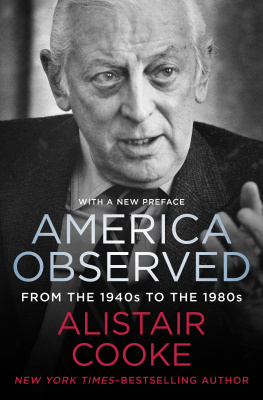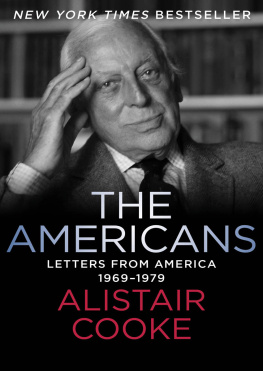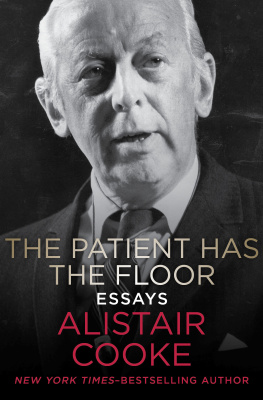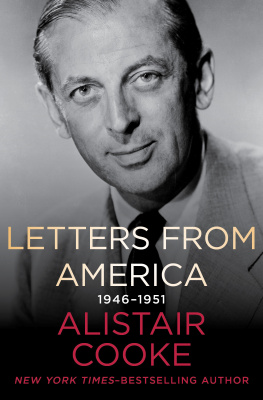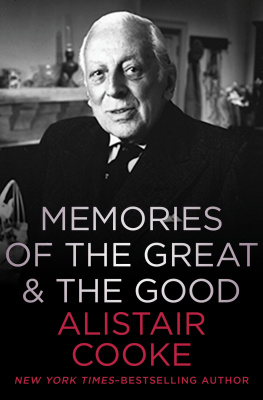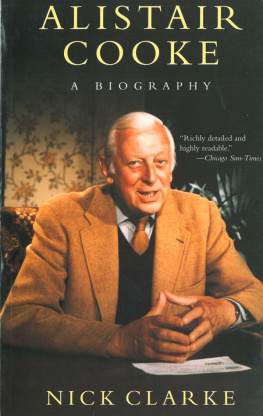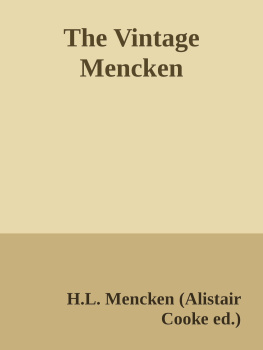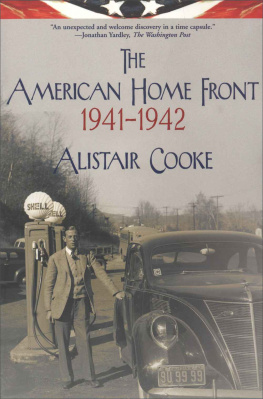Alistair Cooke enjoyed an extraordinary life in print, radio and television. Born in Manchester in 1908 and educated at the universities of Cambridge, Yale and Harvard, he was the Guardians Senior Correspondent in New York for twenty-five years and the host of groundbreaking cultural programmes on American television and of the BBC series America. He was best known both at home and abroad for his weekly BBC broadcast Letter from America, which reported on fifty-eight years of US life, was heard over five continents and totalled 2,869 broadcasts before his retirement in February 2004, far and away the longest-running radio series in broadcasting history.
Alistair Cookes America

PENGUIN BOOKS
PENGUIN BOOKS
Published by the Penguin Group
Penguin Books Ltd, 80 Strand, London WC2R 0RL , England
Penguin Group (USA) Inc., 375 Hudson Street, New York, New York 10014, USA
Penguin Group (Canada), 90 Eglinton Avenue East, Suite 700, Toronto, Ontario, Canada M4P 2Y3
(a division of Pearson Penguin Canada Inc.)
Penguin Ireland, 25 St Stephens Green, Dublin 2, Ireland
(a division of Penguin Books Ltd)
Penguin Group (Australia), 250 Camberwell Road, Camberwell, Victoria 3124, Australia
(a division of Pearson Australia Group Pty Ltd)
Penguin Books India Pvt Ltd, 11 Community Centre, Panchsheel Park, New Delhi 110017, India
Penguin Group (NZ), 67 Apollo Drive, Rosedale, North Shore 0632, New Zealand
(a division of Pearson New Zealand Ltd)
Penguin Books (South Africa) (Pty) Ltd, 24 Sturdee Avenue, Rosebank, Johannesburg 2196, South Africa
Penguin Books Ltd, Registered Offices: 80 Strand, London WC2R 0RL , England
www.penguin.com
First published in the United Kingdom by Weidenfeld and Nicolson 2002
Published in Penguin Books 2008
1
Copyright Alistair Cooke, 1973, 2002
All rights reserved
The moral right of the author has been asserted
Except in the United States of America, this book is sold subject
to the condition that it shall not, by way of trade or otherwise, be lent,
re-sold, hired out, or otherwise circulated without the publishers
prior consent in any form of binding or cover other than that in
which it is published and without a similar condition including this
condition being imposed on the subsequent purchaser
978-0-14-190922-6
Contents
FOR:
JANE
STEPHEN HEARST
MICHAEL GILL
and in memory of
HUW WHELDON
List of Illustrations
. Heap Wolves, a Comanche chief. (Los Angeles County Museum of Natural History)
. Christopher Columbus. (Metropolitan Museum of Art, Gift of J. Pierpont Morgan)
. Indians and a beached canoe. (National Gallery of Canada, Ottawa)
. Sketch of Indian life. (British Museum)
. Buffalo herd. (Thomas Gilcrease Institute of American History and Art, Tulsa, Oklahoma)
. George Washington. (The Henry Francis DuPont Winterthur Museum, England)
. Pottery figure of Franklin. (John Olson, Alistair Cooke collection)
. Thomas Jefferson. (Courtesy of Charles F. Adams)
. Andrew Jackson. (George Eastman House)
. Gold panner. (Western History Collection, Denver Public Library)
. Family of slaves. (New York Historical Society)
. Boys in confederate uniform. (Library of Congress)
. General U. S. Grant and staff. (Library of Congress)
. Abraham Lincoln. (The Meserve Collection, Courtesy of Philip B. Kunhardt, Jr)
. Rockefeller et al. (Brown Bros)
. Italian immigrant family, 1905. (George Eastman House)
. Lynching, Indiana, 1930. (Lyon-Magnum)
. Teddy Roosevelt. (Brown Bros)
. Woodrow Wilson. (Library of Congress)
. Charles Lindbergh with monoplane. (Brown Bros)
Franklin Roosevelt, 1939. (Wide World Photos)
. The burning hulk of U.S.S. Arizona. (U.S. Navy)
. D-Day landings. (U.S. Coast Guard)
. John F. Kennedy in the Oval Office. (A. Rickerby / T. L. Picture Agency)
. Two bored Marines, Vietnam. (David Douglas Dunn)
. Hippies. (John Olson)
. Blacks/National Guard, Mississippi, 1962. (P. Schutzer)
. Swimming pools, California. (Capa-Magnum)
. Las Vegas showgirls. (A. CliftonBlack Star)
To the Reader
(Old & New)
Few invitations in my life have been so daunting as the suggestion of a powerful friend in the British Broadcasting Corporation, that I should follow in the impressive footsteps of Sir Kenneth Clark (Civilisation) and my college friend, Jacob Bronowski (The Ascent of Man) by writing and narrating a thirteen-hour television series on the history of the United States. Civilisation and The Ascent of Man set a standard of historical documentary that has only rarely, if ever, been approached since the BBC reign, over drama and documentary, of the late Huw Wheldon, a dynamo of a Welshman of great verve and imagination.
In the late Nineteen Sixties and early Seventies the chic word amongst producers was commitment. Such a project as the one they proposed must make a statement about or reflect my commitment to a positive point of view. So, it was suggested that the series should organize a procession of Themes: American Puritanism, Money in America, Women in America, Religion, etc., etc. I was then just going into my sixties and, as an inquisitive reporter all my life, was more like one of Isaiah Berlins foxes (seizing on a variety of experiences for what they are in themselves without seeking to fit them into a unitary vision) than a hedgehog (who relates everything to a single central vision). Consequently, among the classics I found I inscribed more ticks in the margin in the work of Aristotle, Chaucer, Mark Twain than in Plato, Dante, Shaw.
Consequently, the theme idea went, and goes, absolutely against my grain. I have always resisted writing pieces called as Robert Benchley put it After 1904, What?
After a prudential break to allow me to think it over, and no further ideological bullying from on high, my preposterous suggestion was accepted that I should attempt, as far as humanly possible, a dispassionate history of the land and peoples that became the United States of America.
Of course it has become conventionally accepted that every long television series will engender a book. But apart from the opportunity to spend two years traveling the whole country again and to read the history from the land it happened on, what was an early revelation to me was that the task of writing and then filming the skeleton of a television script is a very satisfying way of producing, as an historical survey, a full-bodied book. The need to refine ideas, even political issues, into visual images, compels the author to the hard labor of simplifying, of getting down to the nub of, an event, a happening, even of a political issue. This daily discipline was rewarded by what, to me, were remarkable discoveries. A close-up of the blue sticker on a pack of cigarettes did more in five seconds than a five-minute talk on excise taxes and the injustice of no taxation without representation. Standing in western Kansas encircled by an horizon of wheat made me appreciate Catherine the Greats contribution to the victory of the Allies in the First World War. To wander through the relicts of the Forty Niners diggings in the foothills of the Sierras, and an hour later to gaze at San Francisco today, made me appreciate more vividly why Karl Marx in London so gloomily wrote: All manifestoes are now inoperative, all revolutionary hopes futile. The notion of James Madison as the balance valve between two hot extremes (Hamilton the aristocratic principle and George Mason the democratic) may not have supplied the most felicitous image but it pleased the American Bar Association (and earned its Gavel Award!).


